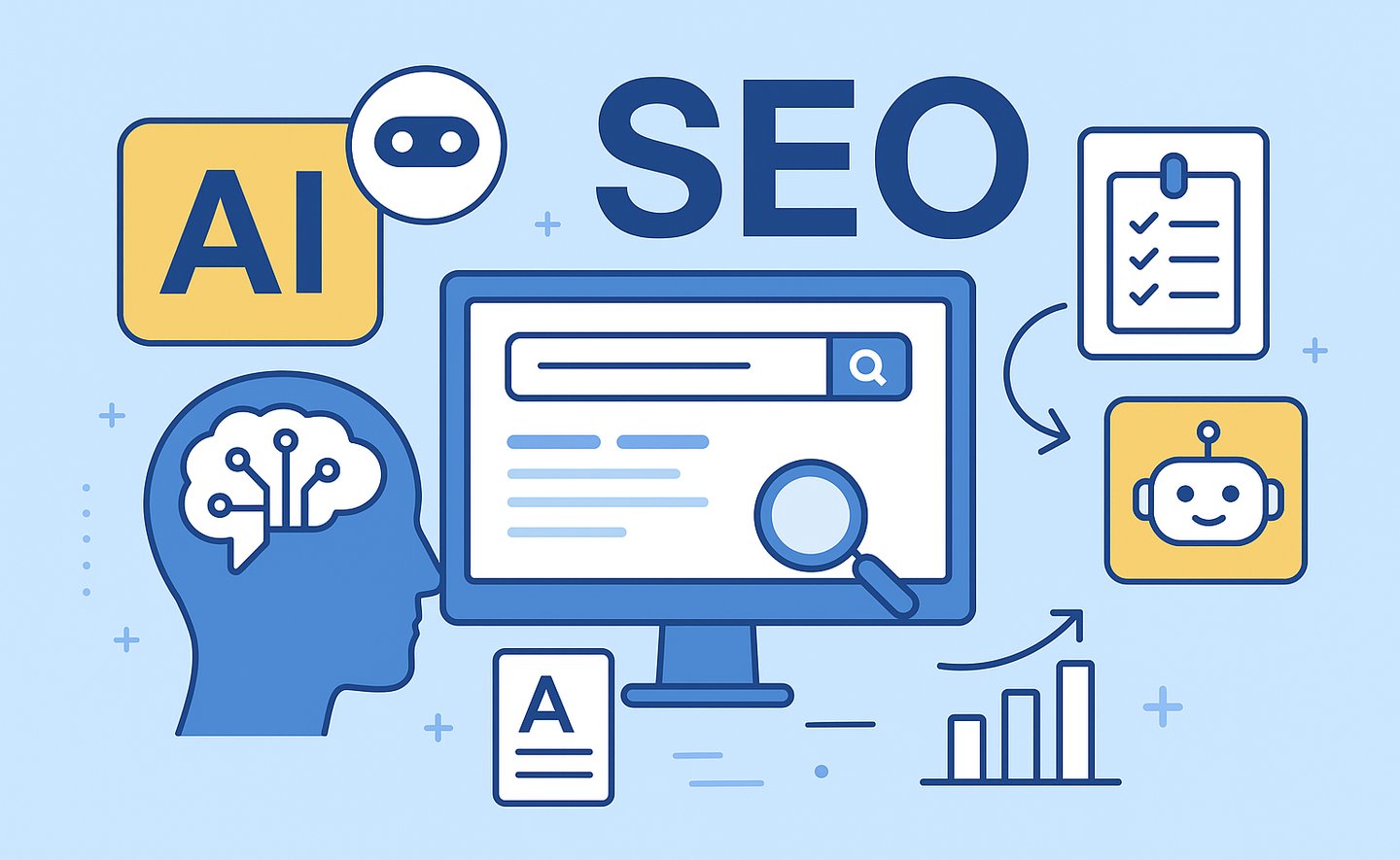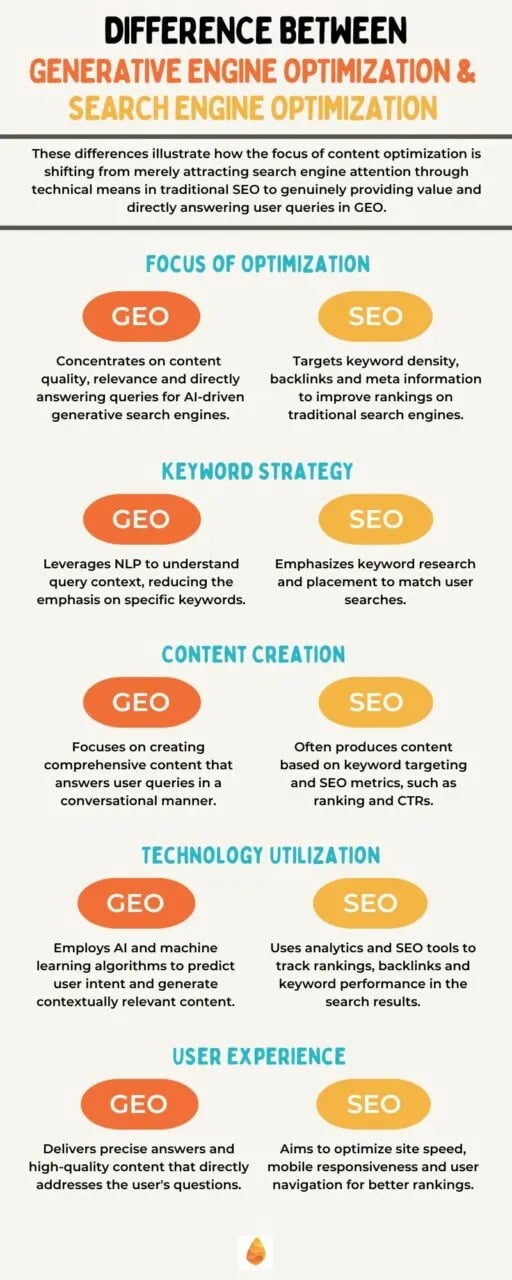How AI is Transforming SEO: Discover How Generative Engine Optimization (GEO) is Changing the Landscape for Businesses
AI is transforming SEO. Generative Engine Optimization (GEO) is the next step for businesses and content creators. Discover how to optimize content for AI-driven search, chatbots, and discoverability. Boost your productivity and get your brand ahead in this new digital landscape.
AISEOGEOCONTENT CREATION
Haily Fox
8/17/20254 min read


How Has AI Changed Search Engine Optimization?
Artificial intelligence has already changed the game of SEO dramatically, and now it’s going even further. Before Generative Engine Optimization, AI altered Search Engine Optimization by:
Creating Smarter Search Algorithms:
Search engines have integrated AI technology to help match searcher intent, natural language, and removing searches that are found with “keywords” alone, replacing it with high-quality content.
Content Creation Optimization:
AI tools can automate the process of analyzing top-ranking webpages, trending keyword optimization, improving reader-friendliness, and predicting performance potential of content.
User Behavior Analysis
AI can quickly analyze how people interact with your content — what interests them, how they engage, and more. It can then use this data to make suggestions to boost engagement.
[1] The Difference Between Search Engine Optimization and Generative AI Optimization [Infographic]. Social Media Today, published Aug. 4, 2025
What is Generative Engine Optimization (GEO)?
GEO is basically the next step in traditional SEO. It doesn’t just optimize for Google or browser search results, but also puts focus on how your content shows up in AI-driven content discovery through search engines and chatbots.
Let’s face it, times are changing. More people than ever are turning to AI to seek answers to questions, as it is more effective than typing keywords alone into a search engine. Sticking only with traditional SEO in mind now will simply put your brand behind in the future.
Why GEO Matters for Businesses
Generative AI now powers not only traditional search results, but also makes recommendations to people looking for a specific type of service, breaking down and favoring content that is structured, high-quality, and relevant.
That’s not the only thing it does either!
Generative AI also answers commonly asked questions by citing content that appropriately answers those questions, which can be a great way for your content to be discovered by potential clients.
Geneva Worldwide is a great example of this. They were able to dominate AI-powered search results, driving visibility beyond what traditional SEO alone could achieve using by optimizing for generative engines like ChatGPT and Google’s AI Overviews. [2]
How Can Businesses Optimize for GEO?
Writing in Natural Language
Including clear context, comprehensive breakdowns of subjects, and clearly providing information that may be relevant to commonly asked questions is key to being picked up by AI.
Structured Data
Bullet points, lists, headers, and good meta descriptions and titles are a must for good GEO results! This helps AI pick up the context of your content.
Authority Signaling
References, links, and content that is written by a human in a human tone will all help with optimizing your content being discovered by AI.
Questions and Answers
As previously mentioned, answering commonly asked questions clearly and concisely is hugely important. Creating tutorials or how-to content mirrors how AI responds to user prompts and will make it easier for AI to detect you.
Bottom Line
Any business leader should be prepared to adapt to the fast-changing nature of SEO and AI. Taking GEO in mind now when structuring your content or website will put your business ahead, and help gain early visibility to both humans and AI.
The faster you integrate GEO into your strategy, the more competitive advantage you’ll have tomorrow.
Drop a comment or Follow me for more human insight on AI. Find us on Instagram or LinkedIn at Am I AI?
I post weekly demos, insights, news and more related to AI.
FAQs
Q: What is Generative Engine Optimization (GEO)?
A: Generative Engine Optimization, or GEO, is the next addition to traditional SEO knowledge. GEO focuses on your content being discovered by AI-driven search engines and chatbots. AI analyzes your content for relevance, clarity, and structure, so the more helpful and organized your content is, the more likely it is to be discovered by Generative AI.
Q: How is GEO different from traditional SEO?
A: Traditional SEO focuses heavily on keywords, backlinks, and page ranking, whereas GEO prioritizes searcher intent, context, and relevancy.
Q: Why is clear authorship important for GEO?
A: AI and search engines prioritize human-created content backed with authority and trustworthiness. It greatly increases the chances of your content being discovered by AI for recommendations or questions.
Q: How can businesses optimize content for GEO?
A: Focus on writing in conversational language that is natural, using headings, bullet points, and FAQs in the structure of your content. It also helps to answer commonly asked questions in a clear, simple manner. Using your original human tone also adds credibility, increasing the chances of it being detected by AI.
Q: Will GEO replace traditional SEO?
A: It is unlikely to replace it entirely. GEO complements traditional SEO rather than replaces it. Businesses still need strong SEO knowledge, backlinks, and site performance. GEO simply ensures your content is ready for AI-driven search discovery, giving you a competitive edge as a respected voice in your field.
Q: What AI tools can help businesses optimize content for SEO and GEO?
A: ChatGPT can help businesses optimize content quickly by generating blog outlines, meta descriptions, and FAQ questions. For example, you can prompt it to create an SEO-friendly article structure around a specific keyword, saving time while ensuring your content is clear, organized, and AI-discoverable.


